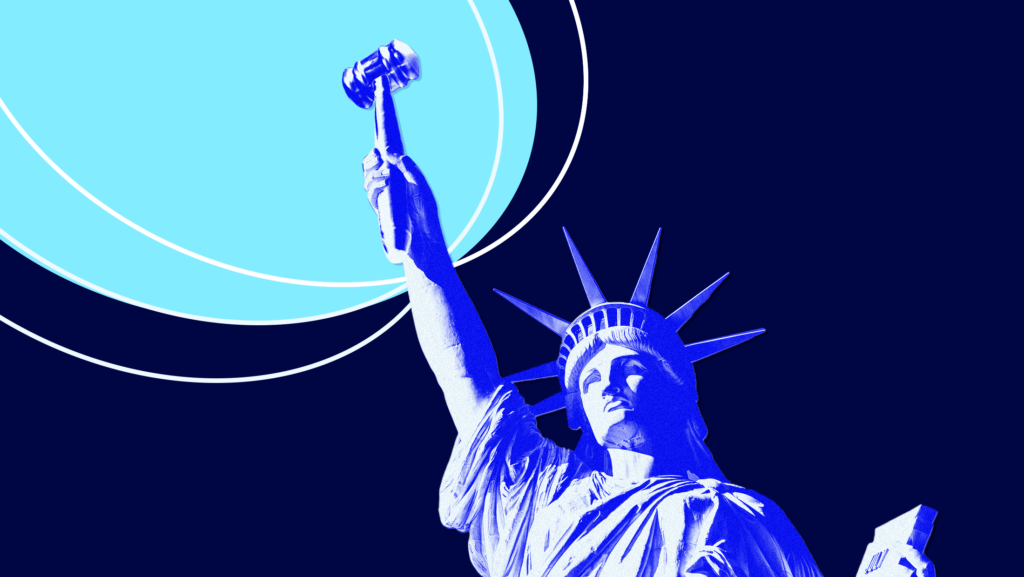A Day That Protected Democracy

If democracy prevails for another two years, it will be because of days like Nov. 3, 2022. On this one day, four courts in four different states weighed in on four cases that strengthened voting rights and free and fair elections. None of those cases grabbed a single national headline. Most received barely even a local mention. What made this day remarkable was its ordinariness. None of these cases were extraordinary. Indeed, that is the point.
One involved a college polling site, another guaranteed a county would print ballots and provide other election materials in Spanish, the other two involved the rules for Election Day and vote counting. While the headlines focus on how courts handle the most sensational attacks on our democracy — from the trials related to the Jan. 6 insurrection to the latest subpoena struggles with former President Donald Trump and his allies — it is the daily work of state and federal courts to ensure voting rights are protected one case at a time.
By the time we reached that day — five days before the midterm elections — we had already seen an avalanche of election litigation. According to a real-time case count maintained by Democracy Docket, by Nov. 3, 170 cases in 35 states had already been filed this year. More than 100 of those cases were still active and ongoing. The night before Nov. 3, Democracy Docket identified seven of the 100 plus active cases that were likely to see rulings before Election Day. Like clockwork, on Nov. 3, courts decided four of those seven cases. Each was a victory for democracy.
If you want to predict the future of democracy, don’t pore over the court dockets in Washington, D.C. Instead, visit the courthouses in places like Lansing, Michigan, Las Vegas, Nevada, York County, Pennsylvania and Poughkeepsie, New York.
The day began with a 5-2 decision from the Michigan Supreme Court pausing a lower court’s decision that blocked rules regulating the behavior of partisan election challengers and poll watchers, which means that the rules are back in effect for the midterm elections. The rules, put forth by Michigan Secretary of State Jocelyn Benson (D), are commonsense guidelines aimed at ensuring partisan election challengers can observe the voting and vote-counting process without becoming disruptive. The court’s decision will undoubtedly mean a more orderly, less chaotic Election Day, which can only serve to increase voter participation and confidence.
Next came a decision from Nevada rejecting a Republican motion to insert partisan election workers into the signature verification process for mail-in ballots. The Republican Party sued Clark County, Nevada’s largest county, to require its election office to hire Republicans to review the signatures on mail-in ballot return envelopes. As far back as 2020, Republicans in the Silver State have complained, without evidence, that the signature verification process used by the state fails to reject ballots with signatures that do not match voters’ signatures on file. The GOP’s proposed solution in this lawsuit was to require the county to intentionally hire Republican partisan workers who — the party hopes — would reject more ballots in the predominantly Democratic county. One week after Republicans filed their request, the court rejected it. An appeal is likely.
Meanwhile in Pennsylvania, a federal district court granted a joint motion that addressed shortcomings in York County, Pennsylvania’s provision of election materials and assistance to its Spanish-speaking population. According to the complaint, York County has a large Puerto Rican community that was not receiving election materials in their native language. Under the terms of the order, York County agreed to remedy this by providing Spanish-language assistance and materials in the upcoming elections.
Finally, late in the day, a mere two days after a lawsuit was filed, a New York state court ordered Dutchess County to designate a polling location on Vassar College’s campus for the 2022 midterm elections. Under New York law, counties are required to provide on-campus polling locations at any college with more than 300 registered voters. Even though Vassar easily exceeds this threshold, the Republican member of the county’s election board refused to allow the county to meet its obligation. While this decision was appealed by the Republican commissioner, as of now Vassar students, faculty, staff and families will now have access to a convenient polling location in compliance with state law.
When we discuss threats to our democracy, we usually describe the apocalyptic and existential. When we discuss how democracy prevails, we too often focus on the heroic actions of the few. But it is not just evil that succeeds through banality. The cases that reach the U.S. Supreme Court are not necessarily the most important to the future of democracy. As important as any one case may be, democracy will not die at the hands of nine justices. The high court simply does not hear enough cases to doom our collective futures.
If you want to predict the future of democracy, don’t pore over the court dockets in Washington, D.C. Instead, visit the courthouses in places like Lansing, Michigan, Las Vegas, Nevada, York County, Pennsylvania and Poughkeepsie, New York. It is places like these where the dozens of pending election cases will be heard. It is where on one day, five days before the election, democracy was on the docket — and it won.